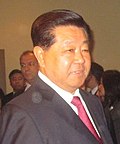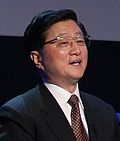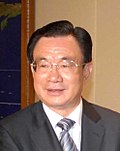Hu–Wen Administration
2002–2013 Chinese administration of Hu Jintao and Wen Jiabao From Wikipedia, the free encyclopedia
The Hu–Wen Administration[b] was the Chinese leadership of general secretary of the Chinese Communist Party (CCP) and Chinese president Hu Jintao, and Chinese premier Wen Jiabao. Hu and Wen officially succeeded Jiang Zemin, Li Peng and Zhu Rongji in 2002. Using the two leaders' surnames, it is abbreviated as Hu–Wen.[c]
Hu–Wen Administration 胡温体制 | |
|---|---|
4th generation Communist leadership of the People's Republic of China | |
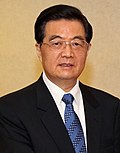 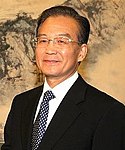 Hu Jintao (left) and Wen Jiabao (right) | |
| Date formed | 15 November 2002 |
| Date dissolved | 15 March 2013 |
| People and organisations | |
| Paramount leader[a] | Hu Jintao |
| President | Hu Jintao |
| Premier | Wen Jiabao |
| Member party | Chinese Communist Party Eight minor parties |
| History | |
| Elections | 5–18 March 2003 5–18 March 2008 |
| Legislature terms | 10th National People's Congress 11th National People's Congress |
| Predecessor | Jiang–Li–Zhu Administration |
| Successor | Xi–Li Administration |
Hu and Wen are considered the fourth generation Chinese leaders and are viewed as, at least ostensibly, more reform-oriented and more open-minded. Hu's contributions to the CCP ideology are officially termed the Scientific Outlook on Development.
CCP Politburo Standing Committee
16th PSC
17th PSC
The Presidency
| Office | Officeholder(s) | Tenure |
|---|---|---|
| President | Hu Jintao | 2003–2013 |
| Vice President | Zeng Qinghong Xi Jinping |
2003–2008 2008–2013 |
Congress and Conference leaders
| Office | Officeholder(s) | Tenure |
|---|---|---|
| Congress Chairman | Wu Bangguo | 2003–2013 |
| Conference Chairman | Jia Qinglin | 2003–2013 |
The State Council
Summarize
Perspective
Notes
- "Paramount leader" is not a formal title; the top position held by Hu Jintao was General Secretary of the Chinese Communist Party, thus the officeholder holds ultimate power and authority over party and state.
- Chinese: 胡温
See also
Wikiwand - on
Seamless Wikipedia browsing. On steroids.



